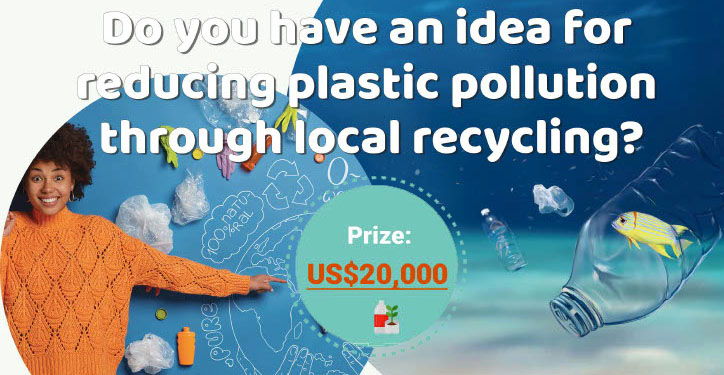Plastic and Volcanic Ash Set to Inspire Recycling Innovation in Saint Vincent and the Grenadines
Media Release: Kingstown, Saint Vincent
The Government of St Vincent and the Grenadines (SVG) has issued an incentivized challenge to inventors within academia and private enterprise to explore the potential of using plastics, and possibly volcanic ash, as raw materials in the production of useful products. The challenge is open to submissions from Vincentians, other OECS Nationals, the wider Caribbean and further field. It is hoped that such a wide afield would yield a range of ideas and concepts.
The project - Recycling Innovation Challenge: Recycling at an Island Level was launched on August 11 and remains open for one month.
Plastic waste constitutes a significant percentage of pollutants posing a threat to the region’s marine space. For St. Vincent and the Grenadines, still grappling with the extensive socio-economic impacts resulting from the 2021 eruption of La Soufriere Volcano, volcanic ash is another major pollutant to air quality and ecosystem health. Therefore, the purpose of the challenge is to support research that addresses the problems caused as a result of plastic waste and whose solutions are suitable to the context of Small Island Developing States (SIDS), such that they can make an important contribution in reducing plastic waste, at a local, national and regional level.
The winning proposal will receive a grant of US$20,000, funded under the OECS project, Building Resilience in the Eastern Caribbean through Reduction of Marine Litter and Pollution Project (ReMLit). ReMLit is a three-year project being implemented by the OECS with funding from the Government of Norway.
St. Vincent and the Grenadines is one of six OECS Member states funded under ReMLit to implement country level projects which directly contribute to the aim of reducing marine litter. SVG’s project, titled “Partnering to Combat Land-Based Sources of Pollution and Improve Ocean Ecosystem Health in St. Vincent and the Grenadines” - is a two-year (2021 to 2022) project to reduce land-based sources of marine pollution by increasing local recycling of plastic waste through public-private partnership. A key strategy of the project is to facilitate action by the public, private sector and civil society stakeholders.
The winner’s grant of US$20,000 grant will fund the development of the selected proposal for demonstration purposes. Adjudicators of the challenge are scrutinizing submissions for possible creative use(s), novel ideas and solutions, potential to reduce social impacts of plastic, and if possible volcanic ash for diversification of agricultural input products with export potential, possible contribution to economic growth, creation of livelihoods, and the involvement of communities.
Proposals can also seek to build on existing relevant research to bridge any knowledge gaps and provide workable solutions.
In announcing the challenge, the Ministry of Tourism, Civil Aviation, Sustainable Development and Culture, noted the success of plastic reuse with ash to produce building bricks in the Philippines, after the eruption of Taal volcano in that country on 12 January, 2020.
The deadline for submission of proposals for the Recycling Innovation Challenge: Recycling at an Island Level is September 30th 2021 at 4:00pm. The winner will be announced at the end of September. The Solid Waste Management Agency has set a four-month timeline for the development of the demonstration by the winning applicant, with January 31, 2022 carded for its unveiling.

